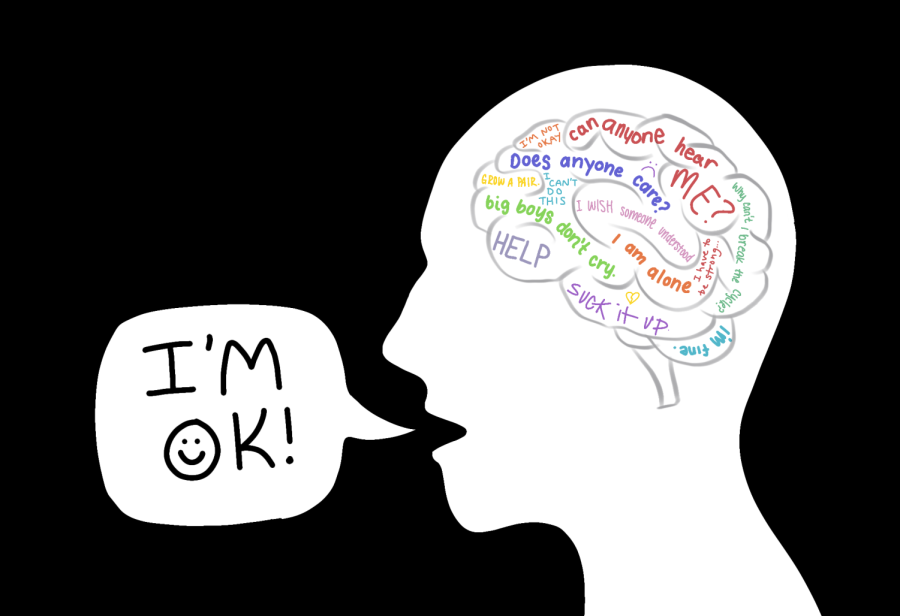MENtal Health: Let’s Talk About It
A look into the stigma surrounding men’s mental health and how to normalize discussing emotions.
If you or a loved one is showing signs of struggling with mental health, these resources are available to help.
National Suicide Prevention Hotline: 988
OR Text “TALK” to 741741
Always dial 911 for emergencies!
According to the American Psychological Association, 50 percent of men show symptoms of mental illness beginning at age 14, and in 75 percent, symptoms appear by the age of 24. If this is such a prominent issue, why don’t we hear it being talked about? Unfortunately, men tend to face heavy stigma when attempting to talk about their struggles or even connect with their own emotions.
Psychology teacher Kelly Forshey explains this stigma.
“There is a stigma around mental health in general, but it’s harder for men to admit to it because of societal pressure to be strong,” Forshey said, “It’s ingrained in boys from the time that they’re young that ‘big boys don’t cry.’”
“What might be depression could come out as anger,” Forshey said, referencing the disproportionate amount of male school shooters and issues such as road rage.
“Men are more likely to isolate themselves, but it’s not seen a lot, because it might be normal for a boy to go play video games and not talk,” Forshey added. Isolating and aggressive behavior being accepted as normal among men is part of why mental health issues go unnoticed until it is sometimes too late.
Chris Rich, another psychology teacher, comments on the importance of recognizing mental health issues.
“You see someone with a broken arm and they get sympathy, but you can’t necessarily see what’s going on with someone who has a mental illness,” Rich said. According to The American Foundation for Suicide Prevention, in 2020 alone, men died by suicide 3.8 times more than women.
“If you let people talk about it, let people know they can come to you… being that supportive person and letting people know ‘hey, it’s okay to talk to me,’ is a good thing,” Rich said when asked what both men and women could do to help destigmatize men’s mental health. A common consensus between these two teachers is to start the conversation young so that future generations can eventually erase the stigma.
Junior Zephyr Fegley shares how he copes with his emotions.
“I do yoga,” Fegley said, “I find it really helpful to center myself. Being able to align my inner being.” Fegley cites spirituality as a core reason for his emotional wellbeing, but not everyone needs to take this route to achieve good mental health.
Senior Jeffrey Tran also shares his thoughts.
“[When I have hard feelings,] I just stay quiet in my room or I walk around outside,” Tran said. He explained that he does not usually reach out for support when he needs it and blames this on both his own choices and feeling that he can’t ask for help.
These are just some perspectives from around Troy High School, but men everywhere can have struggles with their mental health. The stigma around men’s mental health stems from the constant need for men to be “manly.” Boys are often raised with ideas that enforce toxic masculinity, being told to “suck it up” or “be a man.” This constant dismissal of young boys’ emotions can cause serious mental health problems later in life that can be dangerous if gone untreated. By paying attention to signs such as self-isolation, aggression, trouble sleeping and substance abuse, mental health issues can be caught and treated early to prevent anyone from suffering alone.
Check in on your friends, and reach out for help when necessary. Share hotlines, resources and offer support when needed. Most importantly, remind your friends they, and their feelings, matter.
Your donation will support the student journalists of Troy High School - MI. Your contribution will allow us to print our work, purchase equipment and cover our annual website hosting costs.



